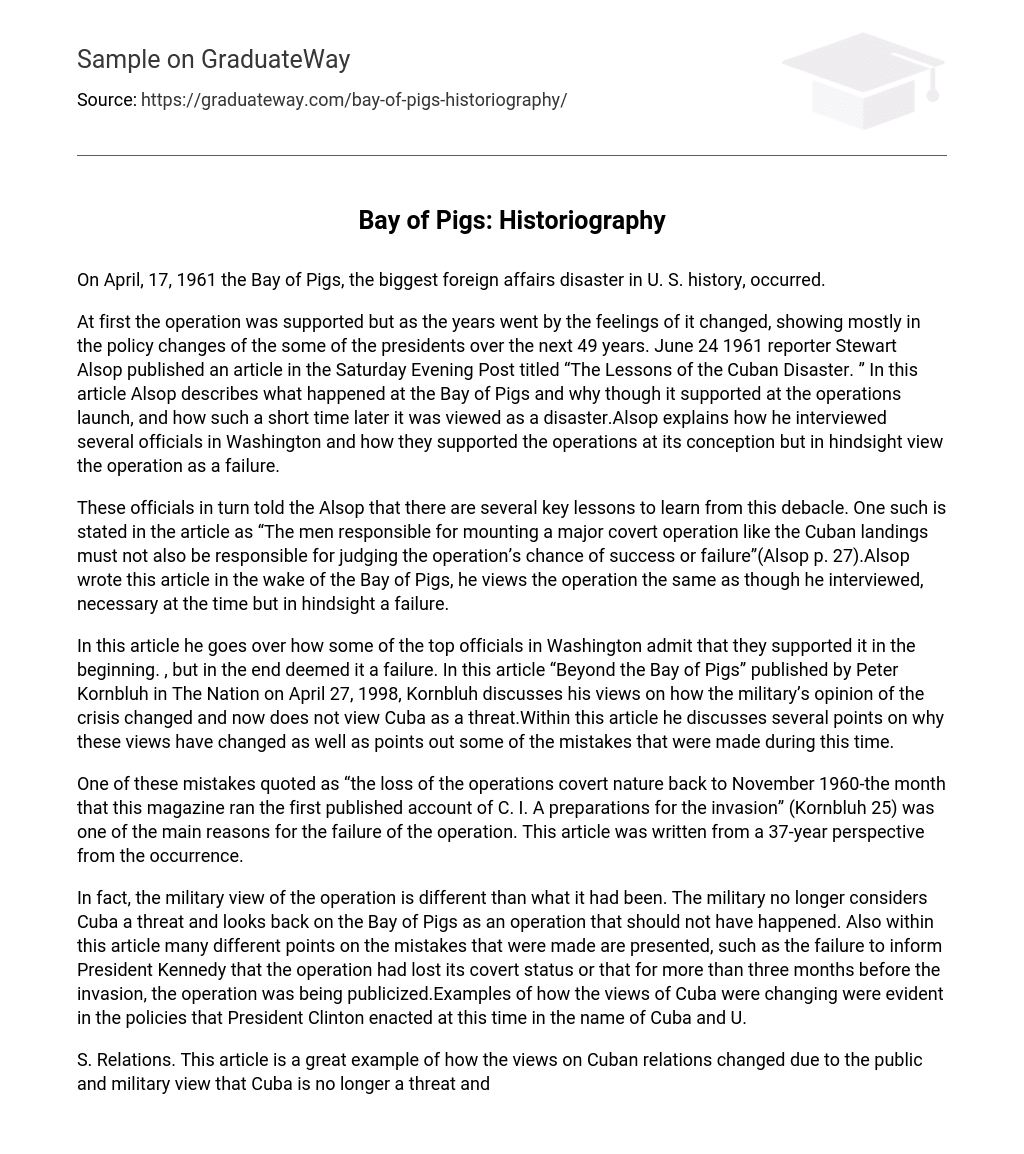April 17, 1961 marked the Bay of Pigs incident, acknowledged as the most significant disaster in American history concerning foreign affairs.
At the outset, there was backing for the operation at the Bay of Pigs. Nevertheless, perspectives towards it gradually shifted. This shift in perspective became apparent through policy alterations made by multiple presidents over the next 49 years. On June 24, 1961, an article titled “The Lessons of the Cuban Disaster” was penned by Stewart Alsop for the Saturday Evening Post. In this piece, Alsop discusses how initially there was support for the events at the Bay of Pigs but they quickly transformed into a perceived disaster. He recounts conducting interviews with various officials in Washington who had initially supported the operation but now regarded it as a failure retrospectively.
According to the Alsop, officials have conveyed a number of important lessons that can be learned from this situation. In the article, it is mentioned that one such lesson is that those accountable for initiating a significant covert operation like the Cuban landings should not also be tasked with evaluating its potential for success or failure (Alsop p. 27). Alsop wrote this article after the Bay of Pigs, perceiving the operation as initially necessary but ultimately a failure in retrospect.
This article by Peter Kornbluh examines the initial support and ultimate failure of the Bay of Pigs invasion by top Washington officials. Titled “Beyond the Bay of Pigs” and published in The Nation on April 27, 1998, Kornbluh explores how military opinions towards Cuba as a non-threat changed over time. He discusses the reasons behind this shift in views and analyzes the mistakes made during the crisis.
According to Kornbluh (25), the failure of the operation was mainly due to a mistake that exposed its covert nature in November 1960. This happened at the same time as the first published account of C.I.A preparations for the invasion. The article offers a retrospective view of this event, 37 years later.
The military’s perception of the operation has shifted, no longer considering Cuba a threat and acknowledging the Bay of Pigs as an error. The article emphasizes multiple mistakes in the mission, such as neglecting to notify President Kennedy that it was no longer covert and prematurely revealing the operation to the public for three months before invading. President Clinton’s policies towards Cuba during this period reflect the evolving perspectives on Cuba.
This article, titled “1961: The Bay of Pigs Invasion,” originally written by Anthony Depalma and published in The New York Times Upfront in 2011, discusses the evolution of perceptions towards Cuban relations. It emphasizes how public and military attitudes have influenced this change and asserts that Cuba is no longer considered a threat. Additionally, it suggests that policy and views can persist for extended periods of time.
Depalma explores the events surrounding the Bay of Pigs and subsequent perspectives. Eisenhower began an embargo, later reinforced by Kennedy. In 2009, President Obama eased restrictions, allowing Cuban-Americans to visit their families. Depalma emphasizes Professor Henken’s viewpoint and other experts who believe Castro will not take advantage of opportunities for Cuba.
Depalma discusses the shifts in perspective between 1961 and 2011. He narrates the events leading up to and encompassing the incident, while also highlighting Cuba’s diminished perception as a threat. Furthermore, he asserts that the Bay of Pigs is now considered as the most significant foreign catastrophe in U.S. history.
He discusses how changes in views have correspondingly led to changes in policies. He provides an example of Obama easing some restrictions imposed on Cuban citizens. This serves as a clear illustration of how the perspectives of the public and military can influence presidential viewpoints. These three articles collectively present an accurate timeline portraying the evolution of policies and American perspectives regarding this incident.
The articles demonstrate that Americans initially regarded the operation as essential, despite some errors. Nevertheless, it has gradually been perceived as a significant failure in the history of U.S. foreign policy. In conclusion, these articles have slightly altered my viewpoint and I trust you have found this information enlightening.





